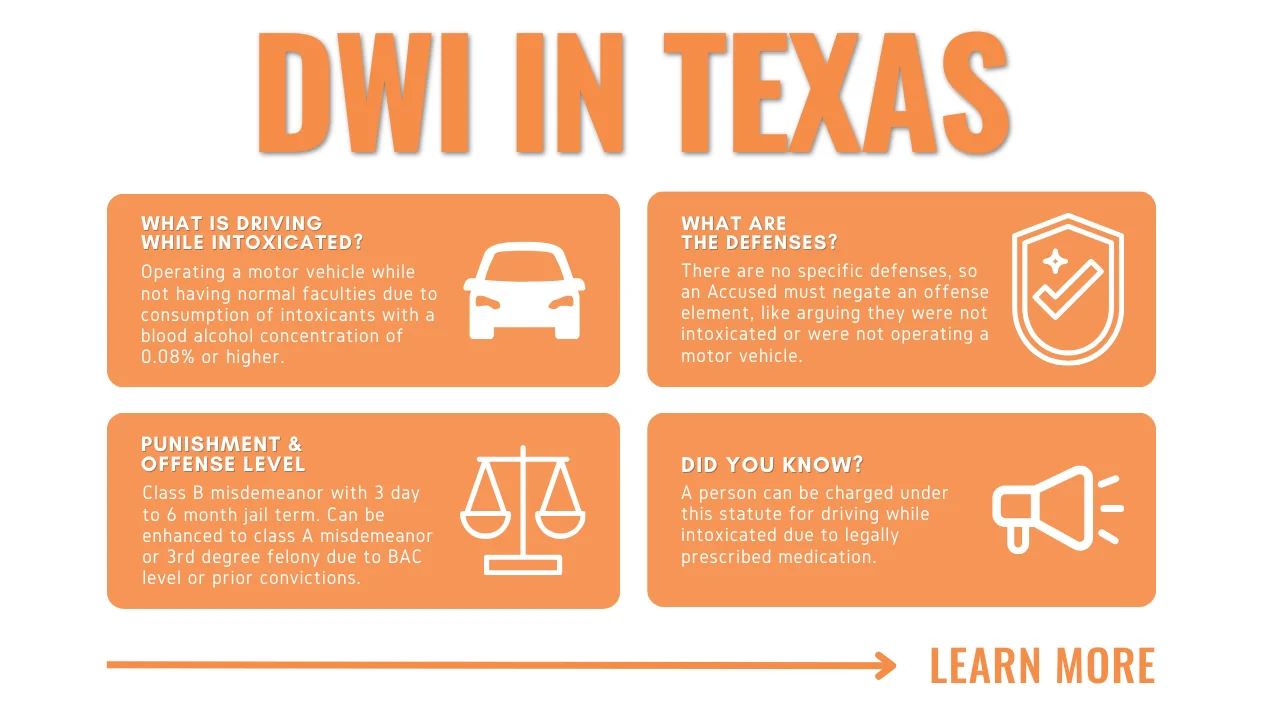
DWI carries severe legal penalties in Texas, including a maximum 1-year jail sentence and up to a $6,000 fine. DWI offenders are also subject to a driver’s license suspension, cancellation of a Texas License to Carry, and a potentially devastating permanent criminal conviction. Additionally, Texas DWI probation can impose lengthy supervisory terms and conditions like alcohol education, community service, ignition interlock device (breathalyzer) requirements, alcohol abuse counseling, and drug/controlled substance testing. Learn the penalties for a DWI arrest in Texas, and what to do if you’re facing a DWI charge.
Summary of Key DWI Penalties in Texas
| Offense | Jail Time | Fines | Additional Penalties |
|---|---|---|---|
| First Offense (Class B) | Up to 6 months | Up to $3,000 | Driver’s license suspension, probation, counseling |
| First Offense with BAC ≥ 0.15 (Class A) | Up to 1 year | Up to $6,000 | Enhanced penalties, ignition interlock device |
| Second Offense | Up to 1 year | Up to $6,000 | Mandatory ignition interlock device |
| Third Offense (Felony) | Up to 10 years | Up to $10,000 | Permanent felony conviction, gun rights suspension |
Is jail time mandatory for a 1st DWI in Texas?
Jail time is not mandatory for a first-offense DWI in Texas even though it is contemplated in the range of punishment. This means certain first-time DWI cases can result in jail, particularly high BAC (blood alcohol content) and vehicle collision cases. An experienced Texas DWI lawyer can assess the severity of a DWI case and mitigate many of these Texas DWI punishments.
How long does a Texas DWI stay on your record?
A Texas DWI stays permanently on criminal records in Texas even when dismissed. The only way to delete a Texas DWI record is by expungement. Expungement is a powerful legal tool in Texas that destroys all records of a DWI arrest from government, police, and law enforcement archives, and allows an individual to deny existence of the expunged charge.

First Offense DWI in Texas
Is a first offense DWI in Texas a felony?
No, a first offense DWI is normally not a felony in Texas. However, first offense DWI cases resulting in the serious bodily injury or death of another, including the passenger, are punishable as the felony offenses Intoxication Assault and Intoxication Manslaughter. These offenses are typically punishable by a maximum 10 and 20-year term of imprisonment, respectively, in addition to a $10,000 fine.
What makes DWI a felony in Texas?
A DWI offender with 2 or more prior DWI convictions is subject to felony DWI 3rd charges and DWI offenders with child passengers are also subject to a State Jail felony charge. Additionally, a a DWI case resulting in the serious bodily injury or death of another, including the passenger, is punishable as either Intoxication Assault or Intoxication Manslaughter, both of which are Texas felony offenses subject to incarceration in the Texas Department of Criminal Justice (TDCJ). A felony conviction can result in the permanent suspension of Second Amendment rights in Texas.
Are Texas Laws strict on DWI?
Yes, Texas law imposes severe DWI penalties. For example, a first-offense DWI carries lengthy jail sentences and probation terms in addition to thousands of dollars in fines and court costs, a driver’s license suspension, sobriety and substance abuse counseling, and a potentially permanent criminal conviction in Texas. Additionally, Texas law enforcement officers enforce strict implied consent laws and have zero tolerance for underage drinking. It is also a penal code criminal charge to operate a watercraft while intoxicated in Texas. Texans facing DWI charges should consult a knowledgeable Texas DWI defense lawyer and law firm to begin building an effective legal defense.
Jail Time for DWI Penalties in Texas
Can You Go To Jail for a DWI in Texas?
Yes, you can go to jail for a DWI in Texas, even for a DWI first offense. However, an effective Texas DWI defense can leverage weaknesses in the prosecutor’s evidence to avoid jail as punishment and instead secure a reduction, a deferral, and even a dismissal in certain circumstances. For example, a DWI defender can challenge the police officer probable cause for the traffic stop to arrange a dismissal or reduced plea.
How long is probation for a first offense DWI in Texas?
DWI 1st carries a maximum probation term of 2 years in Texas. Ultimately, Texas judges determine probation length and can consider the circumstances of the case, the Defendant’s criminal history (if any), and the Defendant’s conduct while on bond in setting these conditions.
Can you drink while on probation for DWI Texas?
No, Texas DWI probation prohibits the consumption of alcohol, often requiring random drug/controlled substance and alcohol testing. Individuals who violate these conditions are subject to arrest, and a probation revocation proceeding in Texas.

What is the most common penalty for a first time offense conviction of a DUI or DWI in Texas?
First-time DWI convictions are commonly punishable by probation, DWI education, community service, and up to 6 months in jail and a maximum $3,000 fine if classified as a class B misdemeanor, or up to 1 year in jail and a maximum $6,000 fine if classified as a class A misdemeanor. DUI (Driving Under the Influence) is punishable as a class C misdemeanor with a maximum $500 fine.
What is the maximum penalty for a regular first offense DWI in Texas?
A regular first DWI is a class B misdemeanor carrying a maximum $3,000 fine and up to 6 months in jail. A first DWI with a BAC (blood alcohol concentration) of 0.15 or higher is a class A misdemeanor with a maximum fine of $6,000 and 1-year jail sentence. Additionally, all misdemeanor DWI cases are subject to a maximum probation term of 2 years pursuant to the Texas Code of Criminal Procedure.
What are the penalties for a first offense for a minor DWI in Texas?
A first offense minor non-aggravated DWI case is typically a class B misdemeanor punishable by up to a $3,000 fine and a maximum 6-month jail sentence in Texas. A minor who operates a motor vehicle with any detectable amount of alcohol in their system is subject to charges for DUI (Driving under the Influence), a class C misdemeanor with a maximum $500 fine in Texas. This is because there is zero tolerance for underage drinking in Texas.
Driving with a DWI Offense Charge in Texas
Can you drive after a DWI arrest in Texas?
Yes, Texans may legally drive immediately following a DWI arrest, although their driver’s license does remain subject to suspension by the Texas Department of Public Safety. A motorist must request an ALR (Administrative License Revocation) hearing within the first 15 days following a DWI arrest in order to contest this administrative license suspension. A DWI conviction can also trigger a Texas Driver’s License suspension. It is illegal to drive a motor vehicle without a valid license but many such individuals may obtain an Occupational Driver’s License in order to drive legally.
Can I get my license back after a DWI in Texas?
Yes, a Texas driver’s license can be reinstated following a suspension. This typically entails waiting out the suspension period and paying a reinstatement fee of $125. Additionally, certain motorists with suspended driver’s license may obtain an Occupational Driver’s License in order to drive for necessary household duties.
How long do you lose your license for a DWI in Texas?
A DWI-related driver’s license suspension can last between 90 days to 2 years depending on the circumstances of the case and the presence of any prior offenses. Certain Repeat DWI offenders are also subject to a lifetime suspension of their CDL and commercial vehicle driving privileges.

Travel restrictions for DWI probation in Texas
Can you travel outside of Texas on DWI probation?
People on DWI probation (or probation for any criminal charge) are typically prohibited from traveling outside their county of residence in Texas. However, a person can petition the court for permission to travel out of their county while on Texas DWI probation. This often entails filing a legal motion specifying the details of travel and holding a hearing before a judge who ultimately decides whether to approve the request.
Can you leave the state if you are on probation in Texas?
A person may not leave the state while on DWI probation in Texas unless they have permission from the judge in their case. In fact, it is a probation violation to leave Texas without approval from the judge. Texas probationers must typically file a legal motion in order to obtain permission to leave the state. Individuals who are allowed to travel are often subject to a urine test upon return to ensure they have not consumed alcoholic beverages.
Can I travel internationally while on probation in Texas?
Yes, international travel is possible while on probation for DWI. A primary consideration is determining if the destination country will allow entry. Canada, for example, often denies entry to Americans with DWI charges. It’s best to consult with Impaired Driving Lawyers in Canada before requesting permission from a Texas judge.
How long does a DWI affect your insurance in Texas?
A DWI can affect car insurance rates for up to 5 to 10 years in Texas. Insurance Companies ultimately have distinct policies regarding DWI in Texas.
DWI in Texas First Offense
A first-time DWI offense in Texas (DWI First Offense Texas) is normally a class B misdemeanor criminal charge with a maximum 6-month jail term and $3,000 fine. However these charges can be enhanced in certain circumstances pursuant to the Texas Penal Code. For example, a DWI with a BAC (blood alcohol content) of 0.15 or higher is a class A misdemeanor with a maximum $6,000 fine and up to 1 year in jail. DWI with an Open Container is punishable at either crime level depending on the BAC (blood alcohol content) in but is subject to a minimum 6 days in jail.
DWI in Texas 2nd Offense
A Texas DWI second offense (DWI-Repeat Offender) is a class A misdemeanor punishable by a maximum $6,000 fine and 1-year jail sentence. Any prior DWI conviction can be used for enhancement purposes including cases older than 30 years. Additionally, all DWI second offenses require an ignition interlock device (Breathalyzer) as a requirement of bail bond and probation in Texas.
Texas DWI laws 3rd offense
DWI 3rd (Habitual DWI – DWI Felony Texas) is the third degree felony charge for DWI offenders with 2 or more prior DWI convictions. DWI 3rd carries a maximum 10-year prison term in addition to a maximum $10,000 fine. Additionally, DWI 3rd is subject to the devastating penalty of a permanent felony conviction and its inherent collateral consequences, like employment difficulties and a suspension of gun rights in Texas. The maximum length for DWI 3rd probation is 10 years.

Looking for a Texas DWI Lawyer?
Trey Porter Named Best Criminal Defense Lawyer in Texas for DWI and DWI First Offense Charges
Trey Porter is a dynamic advocate, nationally recognized for his work in Criminal Defense. He has been voted by his peers as a best lawyer in the field of Criminal and DWI Defense every year since 2015. Recognized by SuperLawyers, Mr. Porter has also been distinguished as a Top 40 Under 40 Criminal Defense Lawyer by the National Trial Lawyers Association. Mr. Porter holds a Superb rating from AVVO, where attorneys are rated based on skillful litigation, client satisfaction, peer endorsements, and positive results. Learn more.













